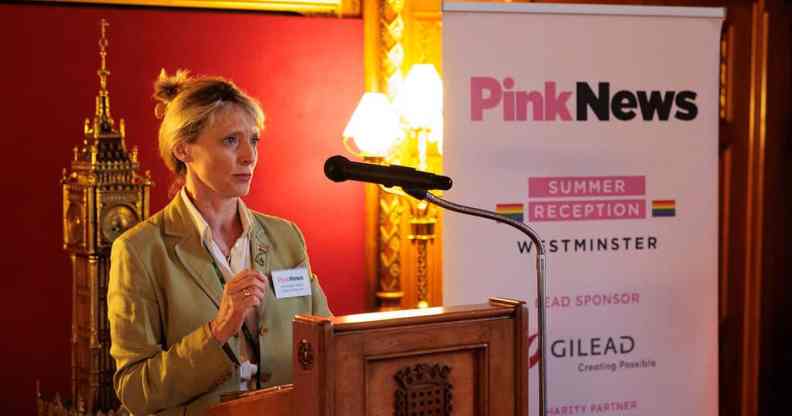Gilead Sciences boss praises ‘passion and dedication’ of LGBTQ+ community in fight against AIDS

Véronique Walsh speaks at the PinkNews Westminster Summer Reception. (Alistair Veryard)
In the UK and Ireland, the AIDS epidemic is no longer about “survival” but about people living with HIV leading long, happy lives, a Gilead Sciences UK&I boss has said.
Véronique Walsh, general manager for the drugmaker’s UK and Ireland operations, reflected on the leaps and bounds in HIV treatments at the PinkNews Westminster Summer Reception on Wednesday (14 July).
She said: “When I started my medical training, HIV was tearing through the LGBT community. Survival was the main objective.
“As a healthcare professional, my objective was to keep people alive for as long as possible and to care for them in the best possible way. And there were days when I thought it was impossible.
“But look at the journey we have been on! Step by step, the fantastic advocacy that came from within the LGBTQ+ community, alongside tremendous science and innovation, has made it possible for people living with HIV to live a full life with a normal life expectancy.”
Walsh said that thanks to public health messaging such as U=U, or undetectable equals untransmittable, stigma is slowly being chipped away. However, not enough people are aware of the progress done to date. A recent YouGov poll done by the Terrence Higgins Trust highlights that HIV stigma remains a big challenge in modern society.
U=U means that those living with HIV who are on effective antiretroviral treatment have zero risk of transmitting the virus to others, according to research. Something that Walsh said was an “unimaginable” concept only years ago.
But more can be done to ensure that those living with HIV do not face discrimination of any kind.
She said: “Our aim is to make sure that people living with HIV feel safe and have a healthy life in a way that enables them live their own life with their own individual choices.
“What are the key learnings from the HIV pandemic for the future? … The LGBTQ+ community fought with passion and dedication – they were unstoppable! I’ve never seen such advocacy before.
“And they are the reason that today we have the treatments that are allowing people to have their life, their choice.”
“When advocacy comes from the community, it is even more powerful, particularly when it [empowers] people to live their whole life,” she added.

Gilead Sciences UK&I boss Véronique Walsh stressed the importance of healthcare that welcomes LGBTQ+ people.(Alistair Veryard)
As treatments and preventive drugs such as pre-exposure prophylaxis, otherwise known as PrEP, continue to be available, Walsh stressed that the wider healthcare needs of LGBTQ+ people must be addressed. This should include rapid access to innovations on treatment and prevention, and we saw the importance of this during the peak of the COVID 19 epidemic.
Walsh credited Live Through This, a cancer charity that supports queer people, as an example of how the LGBTQ+ community must continue to work with healthcare service providers to cover people of all sexualities and gender identities. Medical staff, she stressed, must also be fully trained to know how best to treat queer people and the specific challenges they face.
Considering that LGBTQ+ folk are more likely to experience mental health conditions than their cis-straight counterparts – which only increases for victims of anti-LGBTQ+ hate crimes – this makes inclusive healthcare all the more life-saving.
Trans and non-binary people especially face barriers when it comes to accessing healthcare. Three in 10 trans people postpone medical care when sick or injured due to fear of discrimination, while 19 per cent were rejected help altogether by healthcare providers, according to a 2010 report from the National Center for Transgender Equality.
Even when they do access healthcare, the problems don’t go away. Twenty-eight per cent of those surveyed say they were subjected to harassment in medical settings, with two per cent saying they were victims of violence in a doctor’s office. One in two have had to teach healthcare workers about trans care.
This makes it all the more important for all types of healthcare institutions, from clinics to biopharmaceutical companies like Gilead Sciences, to keep their work and services inclusive for LGBTQ+ people.
“We are here today to celebrate how far we have come in championing rights and fostering safer communities for LGBTQ+ people, but we also recognise that we’re not there yet, and there is a lot of work to be done to protect these rights,” said Walsh.
“I am proud to work for a company that actively addresses and supports the needs of all women, men and non-binary LGBTQ+ community members.
“For Gilead, the way we’re working is to involve and work with the community to support the community.”
- UK-UNB-2499
- Date of prep: July 2022

